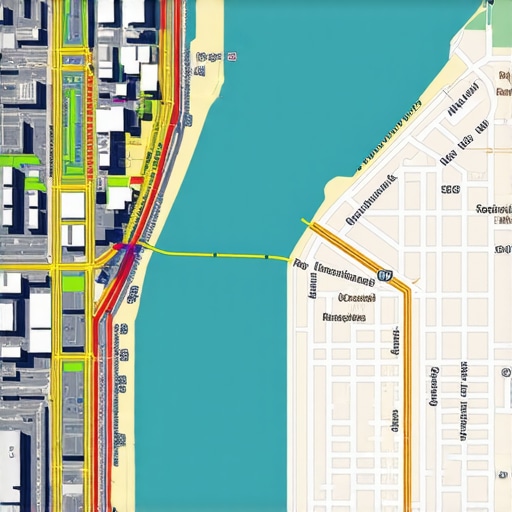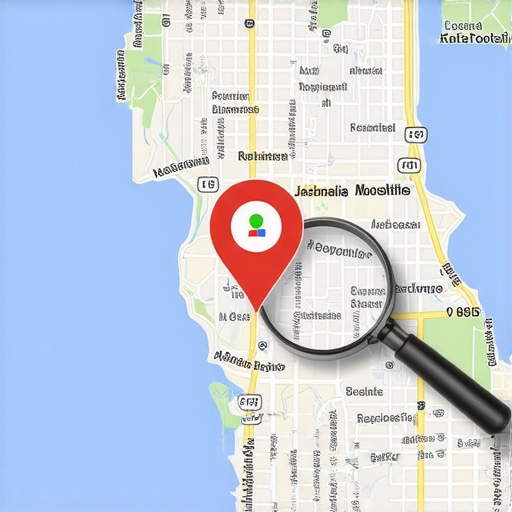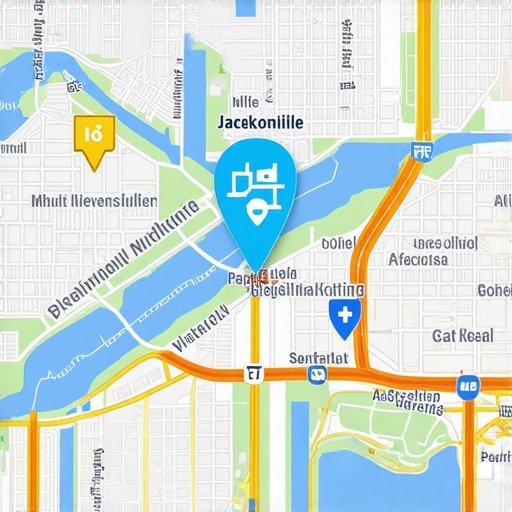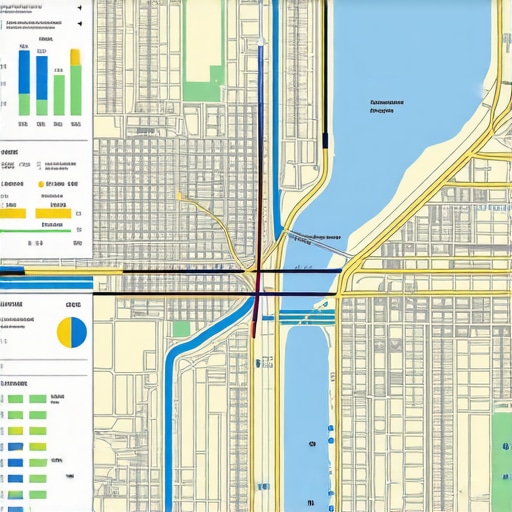My Journey into Google Maps Optimization in Jacksonville
As a local business owner in Jacksonville, I vividly remember the first time I realized the importance of Google Maps for attracting customers. I was struggling to stand out among competitors, and then I stumbled upon some game-changing tips that transformed my online presence. Today, I want to share my personal experience and insights to help you succeed with Google Maps optimization.
Understanding the Power of Local SEO in Jacksonville
Jacksonville’s vibrant business scene means competition is fierce. To get noticed, I learned that optimizing my Google My Business (GMB) profile was essential. It’s like having a digital storefront that’s visible to thousands of potential customers searching for my services. According to local SEO experts, a well-optimized Google Maps listing can dramatically boost your visibility and foot traffic. For more detailed strategies, I recommend checking out this comprehensive guide.
Key Google Maps Optimization Techniques I Swear By
From my experience, several tactics are crucial. First, ensuring your NAP (Name, Address, Phone Number) consistency across all platforms helps Google trust your business info. I also learned that adding high-quality images and regularly updating your GMB profile keeps your listing fresh and engaging. Incorporating relevant keywords naturally into your business description makes a difference, too. For example, mentioning “Jacksonville SEO services” helped me attract local clients actively searching for SEO help.
What Are Some Hidden Tips That Can Boost My Google Maps Rankings?
Great question! I found that actively encouraging satisfied customers to leave reviews significantly impacts rankings. Responding to reviews, whether positive or negative, shows engagement and improves trustworthiness. Additionally, I experimented with local backlinks and citations, which helped Google see my business as a reputable local entity. It’s worth noting that Google’s algorithm favors businesses with consistent, positive online presence—something I learned from reputable sources like Moz.
Finally, staying updated with new maps optimization strategies is vital. Google frequently tweaks its algorithms, so I follow industry blogs and forums to stay ahead. If you’re serious about ranking higher on Google Maps, consider working with local SEO professionals who understand Jacksonville’s unique market dynamics.
If you found these tips helpful, I’d love to hear about your own experiences or questions. Feel free to comment below or reach out through my contact page.
Leveraging Local Citations and Consistency for Superior Visibility in Jacksonville
One of the often-overlooked yet powerful tactics involves building a robust network of local citations. These are mentions of your business name, address, and phone number (NAP) across reputable directories and local platforms. Ensuring NAP consistency is crucial because Google verifies your business information across multiple sources, and discrepancies can harm your rankings. For Jacksonville businesses aiming to stand out, it’s essential to audit existing citations regularly and correct any inconsistencies. Resources like this guide offer detailed steps for effective citation management.
Optimizing Google My Business for Local Authority and Engagement
Beyond basic setup, actively managing your GMB profile can significantly influence your local search presence. This includes posting updates about promotions or events, adding new photos regularly, and responding promptly to customer reviews. Google values high engagement levels, which signal that your business is active and trustworthy. Implementing Q&A management, where you answer common customer questions, can also boost your profile’s relevance. For expert insights, check out this resource.
How Can Local Content and Keyword Optimization Elevate Your Jacksonville Business?
Creating localized content that resonates with your Jacksonville community can be a game-changer. Incorporate neighborhood names, local landmarks, and community events into your website and GMB descriptions. This not only improves relevance for local searches but also builds a stronger connection with your audience. For example, mentioning “serving Jacksonville beaches” or “near Riverside area” can attract nearby customers actively seeking your services. Naturally integrating keywords like “Jacksonville SEO services” or “Jacksonville restaurant” enhances visibility on Google Maps and organic search. Remember, Google prioritizes content that is both relevant and valuable to local users—so focus on providing insightful, community-specific information.
Are There Hidden Technical SEO Tactics That Can Give My Jacksonville Business an Edge?
Absolutely. Technical SEO plays a pivotal role in local rankings. Optimizing your website’s mobile responsiveness ensures a seamless experience for mobile users, who constitute a significant portion of local searches. Implementing structured data markup (Schema.org) can help Google better understand your business details and display rich snippets on Search and Maps. Additionally, fast-loading website speeds and secure HTTPS protocols contribute to higher trust and better rankings. For instance, integrating local schema markup with your website’s contact info can enhance your visibility on Google Maps and in organic results. For comprehensive technical strategies, I recommend reviewing this expert resource.
If you’re eager to further refine your local SEO efforts or want tailored advice, don’t hesitate to reach out. Sharing your experiences or questions can also spark valuable discussions in the comments—let’s grow our Jacksonville business community together!
Unveiling the Nuances of Local Search: My Personal Journey Beyond Basics
As I delved deeper into Google Maps optimization, I discovered that the real challenge lies not just in implementing standard tactics but in understanding the subtle intricacies that influence local rankings. For instance, I realized that Google’s algorithm values user engagement metrics—such as click-through rates and dwell time—more than I initially thought. This insight prompted me to craft more compelling Google My Business posts and ensure my profile’s content was not only keyword-rich but also genuinely engaging, encouraging customers to stay longer and interact more.
The Power of Community Engagement and Personal Connection
One of the most rewarding aspects of refining my local SEO efforts was building authentic relationships with the Jacksonville community. Hosting local events, sponsoring neighborhood initiatives, and actively participating in community forums helped humanize my brand. These efforts translated into more genuine reviews and backlinks, which Google interprets as signals of trustworthiness and authority. I’ve found that fostering a real connection with your local audience creates a ripple effect—more organic reviews, shares, and referrals—ultimately boosting your Google Maps ranking organically. For those interested in fostering community ties, I recommend exploring expert GMB management services that emphasize community-centric strategies.
The Hidden Technical Layers: Schema Markup and Mobile Optimization
Beyond content and engagement, technical SEO plays a crucial role. I experimented extensively with schema markup and found that implementing local business structured data significantly enhanced my visibility with rich snippets—like displaying my hours, reviews, and location directly in search results. This not only improved my click-through rates but also sent stronger trust signals to Google. Additionally, optimizing for mobile responsiveness became a game-changer. During my initial phases, I overlooked how critical fast-loading mobile pages are, especially since most local searches are performed on smartphones. Now, I prioritize a seamless, speedy mobile experience, which has visibly improved my rankings on Google Maps. If you’re eager to explore these tactics further, check out this in-depth guide.
My Reflection: Patience, Persistence, and Continuous Learning
Looking back, mastering Google Maps optimization is a journey that requires patience and a willingness to adapt. It’s not a one-and-done task but an ongoing process—constantly monitoring your rankings, experimenting with new strategies, and staying ahead of algorithm updates. I’ve learned that the most successful local businesses are those that view SEO as an integral part of their community outreach, not just a technical task. Sharing my experiences here is my way of encouraging others to stay committed and curious. If you’ve found these insights helpful or have your own stories, I’d love to hear your thoughts—drop a comment or connect through my contact page. Let’s grow our Jacksonville business community together and keep pushing the boundaries of what’s possible with local SEO!
Deciphering the Algorithm’s Hidden Layers: My Personal Deep Dive
Over the years, I’ve come to realize that Google’s local search algorithm is a complex, ever-evolving entity that rewards authenticity and engagement. Beyond the standard tactics, I’ve invested significant time analyzing how user interaction metrics—such as click-through rates, dwell time, and review sentiment—affect rankings. This understanding led me to craft content that not only targets keywords but also fosters genuine connections with my audience. For instance, I started integrating storytelling into my GMB posts, sharing behind-the-scenes glimpses of my community involvement, which increased engagement and trust. According to Moz’s recent research, local relevance combined with user engagement signals can dramatically influence Google Maps rankings, underscoring the importance of a holistic approach. If you’re serious about elevating your local presence, exploring these nuanced factors can provide a substantial edge.
Harnessing Schema Markup for Local Authority: My Technical Blueprint
Implementing structured data markup has been a game-changer in my SEO arsenal. By embedding local business schema—detailing my hours, location, services, and reviews—I was able to enhance how Google perceives and displays my business in search results. Rich snippets, such as star ratings and product availability, significantly increased my visibility and click-through rates. I meticulously tested different schema configurations, aligning with guidelines from industry leaders like Search Engine Journal. The results were tangible: a notable boost in Google Maps prominence and organic traffic. For those seeking a technical edge, mastering schema markup and ensuring compliance with Google’s structured data policies is indispensable. To get started, I recommend consulting detailed tutorials on this resource.
Optimizing for Mobile-First: My Experience with Speed and Responsiveness
In my journey, prioritizing mobile optimization has been paramount. Recognizing that the majority of local searches originate from smartphones, I invested in a mobile-first website redesign that emphasized speed, usability, and local relevance. Compressing images, leveraging browser caching, and adopting a responsive layout resulted in faster load times and a smoother user experience. Google’s shift toward mobile-first indexing made this a non-negotiable step. The impact was profound: my rankings on Google Maps improved significantly, and customer interactions increased. Tools like Google’s PageSpeed Insights and Lighthouse proved invaluable in diagnosing and enhancing mobile performance. For any local business aiming for top-tier visibility, I cannot stress enough the importance of technical optimization tailored for mobile users.
Is Local Content Creation a Secret Weapon for Niche Domination?
Absolutely. Creating hyper-local content has enabled me to establish authority within my Jacksonville community. Sharing stories about local landmarks, participating in neighborhood events, and highlighting community success stories resonated deeply with my audience. Incorporating geo-specific keywords naturally into blog posts and GMB descriptions improved my relevance scores. I also engaged with local forums and social groups, which led to backlinks and reviews—key signals Google values highly. An insightful case study from Ahrefs confirms that localized content can boost both organic and map rankings when paired with strategic keyword targeting. If you’re looking to deepen your local roots, immersing yourself in community-centric content is a proven strategy that pays dividends.
Ready to Elevate Your Jacksonville Business? Let’s Connect
If you’re eager to delve deeper into these advanced strategies or share your own experiences, I encourage you to reach out. I regularly update my techniques based on the latest algorithm shifts and industry insights, so connecting can help you stay ahead. Visit my contact page to start a conversation. Together, we can unlock your business’s full potential on Google Maps and beyond. Remember, mastery of local SEO is a continuous journey—embrace it with persistence and curiosity, and the results will follow.
Things I Wish I Knew Earlier (or You Might Find Surprising)
Beyond the Basics: Engagement Matters More Than You Think
When I first started focusing on Google Maps, I underestimated how much user engagement—like reviews and interactions—could influence rankings. It’s not just about setting up your profile; actively encouraging reviews and responding to them can dramatically boost your local visibility. I learned this the hard way when my competitors outperformed me despite similar profiles, simply because they had more engaged customers.
The Power of Community Involvement
Getting involved locally, whether through sponsoring events or participating in neighborhood forums, created authentic backlinks and reviews for my business. This community-centric approach made Google trust my business more, translating into higher rankings. It’s a reminder that local SEO is as much about building relationships as optimizing online profiles.
Technical SEO Isn’t Just for Developers
Implementing schema markup and optimizing for mobile responsiveness seemed daunting at first, but I realized these technical tweaks are accessible with some research. They made my business stand out with rich snippets, and my site’s mobile speed improved, contributing to better rankings. Investing time here paid off in increased foot traffic.
Creating Local Content Is a Game-Changer
By sharing stories about Jacksonville landmarks, community events, and local success stories, I connected more deeply with my audience. Incorporating geo-specific keywords naturally into content boosted my relevance on Google Maps. It’s about making your business an integral part of the community fabric.
Patience and Persistence Are Key
SEO isn’t a quick fix. I’ve learned that consistent effort—regularly updating my profile, engaging with customers, and monitoring analytics—over months yields sustainable results. Staying adaptable and learning from updates keeps your business competitive.
Resources I’ve Come to Trust Over Time
- Moz: Their blog and tools are invaluable for understanding local SEO nuances. I often revisit their articles for updates and strategies.
- Google’s Official Business Blog: Staying informed about algorithm changes and new features directly from Google has helped me adapt quickly.
- Search Engine Journal: Their expert analyses and case studies provide practical insights that I’ve found applicable to my business.
- Ahrefs Blog: Their tips on content and backlink strategies have helped me deepen my local SEO efforts.
Parting Thoughts from My Perspective
Mastering Google Maps optimization in Jacksonville has been a rewarding journey of continuous learning and community engagement. The key takeaway? It’s about blending technical SEO with genuine local connections. If you’re serious about boosting your visibility, start small, stay consistent, and don’t hesitate to seek out trusted resources like this guide. I’d love to hear your experiences—feel free to share your thoughts or questions below. Let’s grow our Jacksonville businesses together and make our community thrive!




Reading through the detailed journey into Google Maps optimization here is quite inspiring. I resonate with the importance of community engagement and local citations, as I’ve noticed firsthand how actively participating in neighborhood events and maintaining consistent NAP information can significantly enhance visibility. I’ve also started experimenting with schema markup recently, especially for service-based businesses, and seeing some promising results in the form of richer listings and higher click-through rates. One aspect I’d love to explore more is how to encourage reviews without sounding pushy—sometimes I worry about crossing the line. Have others here found effective strategies to motivate satisfied customers to leave reviews organically? Also, in your experience, how frequently do you recommend updating GMB profiles to stay ahead in such a competitive Jacksonville market? Always eager to learn new tactics or tips to build stronger local presence.
This post really hits home for me, especially the importance of community engagement in boosting local SEO in Jacksonville. I’ve seen firsthand how sponsoring local events and actively participating in neighborhood forums can significantly improve not just reviews but also backlinks and trust from Google. Initially, I underestimated how crucial local stories and landmarks could be in my content strategy, but now I see they make a real impact on relevance and ranking. One challenge I face is maintaining fresh, community-relevant content consistently, particularly when balancing day-to-day operations. How do others here manage to keep their content and profile updated without it becoming overwhelming? Also, I’m curious—what’s everyone’s take on the ideal frequency for posting updates or replying to reviews to stay active but not appear spammy? Would love to hear some tried-and-true tips from fellow Jacksonville business owners.
This post really resonates with my experience as a Jacksonville local. I agree that community involvement and accurate NAP information are cornerstones for effective local SEO. I’ve been trying to leverage customer stories and neighborhood highlights to boost relevance, and I’ve seen some promising results. One thing I’ve noticed is that the timing of review requests plays a role in encouraging organic feedback without seeming pushy. I usually ask satisfied customers within 24 hours of their service, which seems to strike a good balance. Also, I’ve started using Google Posts more frequently to keep my GMB profile active without overwhelming it. As for maintaining profile updates alongside daily operations, I find batching content creation weekly helps me stay consistent. How do others here time their review requests or manage content updates without it becoming a chore? Would love to hear tips from fellow Jacksonville entrepreneurs.
Reading about your journey into Google Maps optimization in Jacksonville really resonates with my own experiences. I’ve found that consistent engagement—like replying to reviews and updating posts—can make a major difference, but it’s often tough to stay motivated amidst daily business demands. One thing I’ve been exploring is how to leverage community events to boost local signals even further. For example, sponsoring a local charity or hosting small meetups has not only strengthened community ties but also garnered organic reviews and backlinks. It’s fascinating how authentic involvement can translate into higher rankings on Google Maps. My question for fellow local business owners is: what’s your strategy for balancing ongoing profile management with the day-to-day hustle of running a business? Do you batch your updates weekly or handle them more spontaneously? I’d love to hear the tactics that work best for others, especially in a competitive market like Jacksonville.
This post really underscores how much community involvement can influence local SEO success in Jacksonville. I’ve seen firsthand how sponsoring local events and consistently updating your GMB profile can build trust and authority with both Google and potential customers. I’ve started to focus more on storytelling through my Google Posts, sharing behind-the-scenes looks at community projects I sponsor, which seems to drive more engagement. One thing I’d add is the importance of monitoring your local citations — ensuring consistency across directories can be tedious but pays off in higher rankings. I’d love to hear how others manage updating their profiles without it becoming overwhelming, especially when juggling multiple responsibilities. Have you found any tools that help streamline citation audits and profile management? Also, what kind of community-centric content has worked best for you to boost local relevance? Looking forward to hearing different strategies from everyone here—let’s keep growing together in Jacksonville!
Reading your journey with Google Maps in Jacksonville really sheds light on how vital local SEO is, especially in such a bustling market. I agree that consistency across NAP and regular profile updates are key, but I’ve also found that engaging with the community personally—like attending local events or sponsoring neighborhood activities—can dramatically boost trust and reviews. When it comes to encouraging reviews, I’ve had good results with follow-up emails that thank customers for their business and gently remind them to share their experience. I wonder, what strategies have you all found effective for motivating satisfied clients to leave reviews without seeming too pushy? Do you think regional customizing of review requests makes a difference? I’d love to hear others’ approaches, as maintaining a strong local profile is truly an ongoing effort. Thanks for sharing your insights, it’s inspiring to see how focus and community engagement can elevate a business’s local presence.
Reading through the detailed journey into Google Maps optimization here is quite inspiring. I resonate with the importance of community engagement and local citations, as I’ve noticed firsthand how actively participating in neighborhood events and maintaining consistent NAP information can significantly enhance visibility. I’ve also started experimenting with schema markup recently, especially for service-based businesses, and seeing some promising results in the form of richer listings and higher click-through rates. One aspect I’d love to explore more is how to encourage reviews without sounding pushy—sometimes I worry about crossing the line. Have others here found effective strategies to motivate satisfied customers to leave reviews organically? Also, in your experience, how frequently do you recommend updating GMB profiles to stay ahead in such a competitive Jacksonville market? Always eager to learn new tactics or tips to build a stronger local presence.